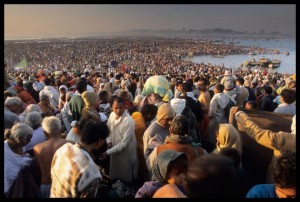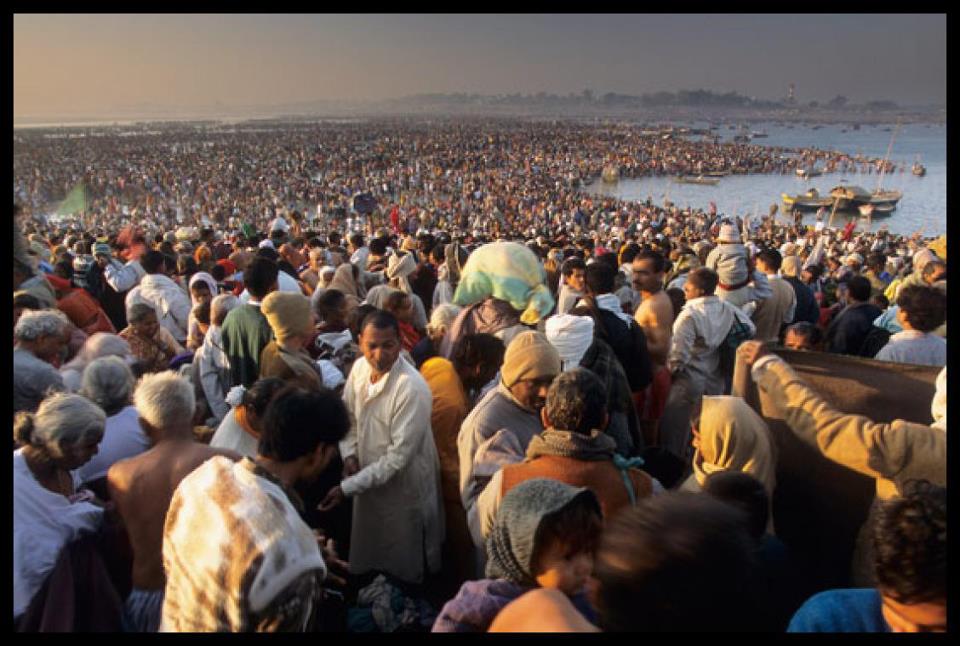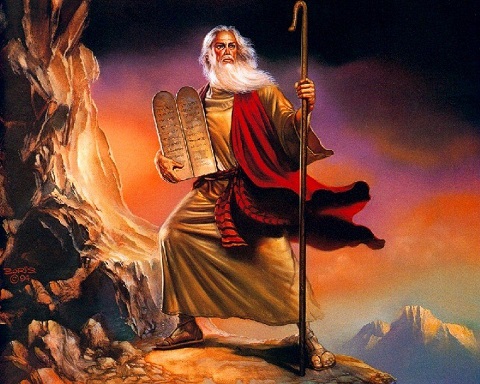The largest gathering ever in human history happened this year in 2013 – the Kumbh Mela festival which is celebrated only once every 12 years. A staggering 100 million people descended on the city of Allahabad by the shores of the Ganges River through the 55 day festival season, with 10 million having bathed in the Ganges just on the opening day alone.

Organizers expected 20 million bathers on the peak bathing day of February 15, according to NDTV. I have been to Allahabad and I cannot imagine how these many millions could be there at once without all functions seizing up. The BBC reported that huge efforts were made to bring things like toilets and doctors to meet the day-to-day needs of these people. These Khumb Mela numbers dwarfed that of the annual Hajj pilgrimages to Mecca that Muslims make – a ‘mere’ 3.1 million in 2012.
So why did 100 million people spend 120 billion rupees to bathe in the Ganges river? One devotee from Nepal reported to the BBC that
“I have washed off my sins”.
Reuters reports that
“I wash away all my sins, from this life and before,” said wandering ascetic Swami Shankranand Saraswati, 77, shivering naked in the cold.
NDTV tells us that
Worshippers, who believe a dip in the holy waters cleanses them of their sins,
In the previous 2001 festival I noticed on the then-BBC interview that pilgrim Mohan Sharma reported that “the sins we have created are washed away here”.
The universal human sense of ‘sin’
In other words, multiple millions will spend money, travel on crowded trains, endure congested situations and bathe in The Ganges River to have their sins ‘washed away’. Before we look at what these devotees are doing, let us consider the problem that they are recognizing in their own lives – sin.
Śri Sathya Sai Baba and ‘Right’ and ‘Wrong’
In my ‘About Me’ page I wrote about some moral teachings from Śri Sathya Sai Baba, whose precepts I thought admirable. I reproduce them again below. Ask yourself as you read them “Are these good moral precepts to live by? Should I live by them?”
“And what is dharma (Our moral duty)? Practicing what you preach, doing as you say it has to be done, keeping precept and practice in line. Earn virtuously, yearn piously; live in fear of God, live for reaching God: that is dharma” Sathya Sai Speaks 4, p. 339
“What exactly is your duty?…
- First tend your parents with love and reverence and gratitude.
- Second, speak the truth and act virtuously.
- Third, whenever you have a few moments to spare, repeat the name of the Lord with the form in your mind.
- Fourth, never indulge in talking ill of others or try to discover faults in others.
- And finally, do not cause pain to others in any form” Sathya Sai Speaks 4, pp.348-349
“Whoever subdues his egoism, conquers his selfish desires, destroys his bestial feelings and impulses, and gives up the natural tendency to regard the body as self, he is surely on the path of dharma” Dharma Vahini, p.4
As I read these I found that these were precepts that I should live – as a simple moral duty. But have you really been living by them? Have you (and I) measured up? What happens when we fail or do not measure up to these precepts. Śri Sathya Sai Baba continues his teachings by answering this question in the following way
“Generally, I speak sweet, but on this matter of discipline, I will not grant any concessions … I will insist on strict obedience. I shall not reduce the rigor to suit your level, ” Sathya Sai Speaks 2, p.186
That level of rigor is fine – if you always meet the requirements. But what if you do not? This is where the concept of ‘sin’ then comes from. When I miss the moral target, or fall short in doing what I know I should do then I sin and I am a sinner. No one likes being told they are a ‘sinner’ – it is something that makes us uncomfortable and guilty, and in fact we spend much mental and emotional energy trying to rationalize all these thoughts away. Perhaps we look to another teacher other than Śri Sathya Sai Baba, but if he is a ‘good’ teacher, his moral precepts will be very similar – too hard to do.
The Bible (Veda Pusthakam) says that all of us feel this sense of sin, regardless of religion or education level because this sense of sin comes from our conscience. The Veda Pusthakam expresses it this way
Indeed, when Gentiles (ie non-Jews), who do not have the law (Ten Commandments in Bible), do by nature things required by the law, they are a law for themselves, even though they do not have the law. They show that the requirements of the law are written on their hearts, their consciences also bearing witness, and their thoughts sometimes accusing them and at other times even defending them. (Romans 2:14-15)
Thus this is why millions of pilgrims feel their sin. It is just like the Veda Pusthakam (Bible) says
all have sinned and fall short of the glory of God (Romans 3:23)
Sin expressed in Pratasana Mantram
This notion is expressed in the well-known Prartha Snana (or Pratasana) mantram which I reproduce below
I am a sinner. I am the result of sin. I am born in sin. My soul is under sin. I am the worst of sinners. O Lord who has the beautiful eyes, Save me, O Lord of the Sacrifice.
This expresses the same spirit as the Upanishad prayer I referenced in Welcome to Satya veda Pustahakan.
The Gospel ‘washes our sins’
The Gospel addresses the very issue that these devoted pilgrims are seeking – to have their ‘sins washed away’. It promises a blessing to those who wash their ‘robes’ (ie their moral actions). The blessing is one of immortality (tree of life) in heaven (‘the city’).
“Blessed are those who wash their robes, that they may have the right to the tree of life and may go through the gates into the city. (Revelation 22:14)
The Kumbh Mela Festival shows us the ‘bad news’ of the reality of our sin, and it thus should awaken us to look for cleansing. Even if there exists only a remote possibility that this Promise from the Gospel is true, because it is so important, surely it is worthwhile to investigate it in a more thorough manner.
If you are interested in eternal life, if you desire freedom from Sin then it would be wise to journey along to see what has been revealed about how and why Prajapati (or Yahweh) provided for us through self-sacrifice of Jesus so that we can gain heaven. And the Vedas do not leave us hanging. In Rg Veda is the Purusasukta which describes the incarnation of Prajapati and the sacrifice He made for us. Click here to see the introduction to Purusasukta which describes Purusa like the Bible (Veda Pusthakam) describes Yeshu Satsang (Jesus of Nazareth) and his sacrifice to bring you Moksha or Mukti (immortality).



